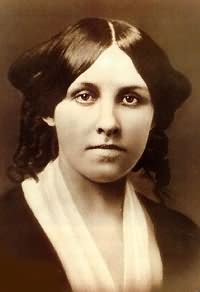 As its name suggests, “Transfiguration,” by Louisa May Alcott, is about change, and specifically change for the better. The poem was written about Alcott’s mother after her death, and it’s filled with so much love and admiration that one can’t help but feel better about death after reading it. The poem shows a sincere reverence for death, viewing it as an improvement on life. The first stanza makes this point perfectly clear:
As its name suggests, “Transfiguration,” by Louisa May Alcott, is about change, and specifically change for the better. The poem was written about Alcott’s mother after her death, and it’s filled with so much love and admiration that one can’t help but feel better about death after reading it. The poem shows a sincere reverence for death, viewing it as an improvement on life. The first stanza makes this point perfectly clear:
Mysterious death! who in a single hour
Life’s gold can so refine.
And by thy art divine
Change mortal weakness to immortal power! (1-4)
Death is able to “refine” (2) life’s “gold” (2), meaning it takes something already beautiful and valuable and makes it completely pure, completely free from impurities. Death also uses its incredible skill, or “art divine” (3), for good, not for evil. It grants “immortal power” (4) and ameliorates “weakness” (4).
Even as Alcott and her sisters (she had three) witness their mother’s passing (“we watched her fading heavenward, through our tears” [8]), they understand that she is going to a better place, not a worse one. As the poet puts it, “a miracle was wrought” (10). She then goes on to describe her vision of what happens after death: “She lived again – brave, beautiful, and young./Age, pain, and sorrow dropped the veils they wore” (12-13). Her mother loses all the things that are weighing her down, and she is left rejuvenated. Alcott also realizes that she needn’t spend all her time grieving for her mother, because she is still with her in spirit, and in the memories in which she is immortalized:
How could we mourn like those who are bereft,
When every pang of grief
Found balm for its relief
In counting up the treasures she had left? (21-24)
Alcott feels lucky, rather than depressed. She doesn’t feel like she has lost something, because she knows her mother has gained so much: “…every pang of grief/Found balm for its relief…” (22-23). She knows that her mother has left behind so many memories, so much wisdom, that she doesn’t need to spend the rest of her life mourning. She even admires her mother’s courage in taking this next step:
Oh, noble woman! Never more a queen
Than in the laying down
Of sceptre and of crown
To win a kingdom, yet unseen… (41-44)
Alcott’s mother is bravely relinquishing this world and moving forward. She is going from something familiar to something completely unknown. But the poet maintains her view that this new place is “a kingdom” (44). Alcott feels that her mother is blazing the trail for them; she is “teaching [them] how to seek the highest goal” (45). Dying well, dying graciously, means “earn[ing] the true success –/To live, to love, to bless –/And mak[ing] death proud to take a royal soul” (46-48). Her mother has achieved this, and this is exactly what makes Alcott accept the necessity of death, and contentedly.
Suggestions for Further Reading:
- A biography of Louisa May Alcott
- “The Importance of Memories” (SevenPonds)

 “Transfiguration” by Louisa May Alcott
“Transfiguration” by Louisa May Alcott



 “Other Side” Documentary Directed by Carter Oakley and Heather Hogan
“Other Side” Documentary Directed by Carter Oakley and Heather Hogan
 The Other Death in the Family
The Other Death in the Family















